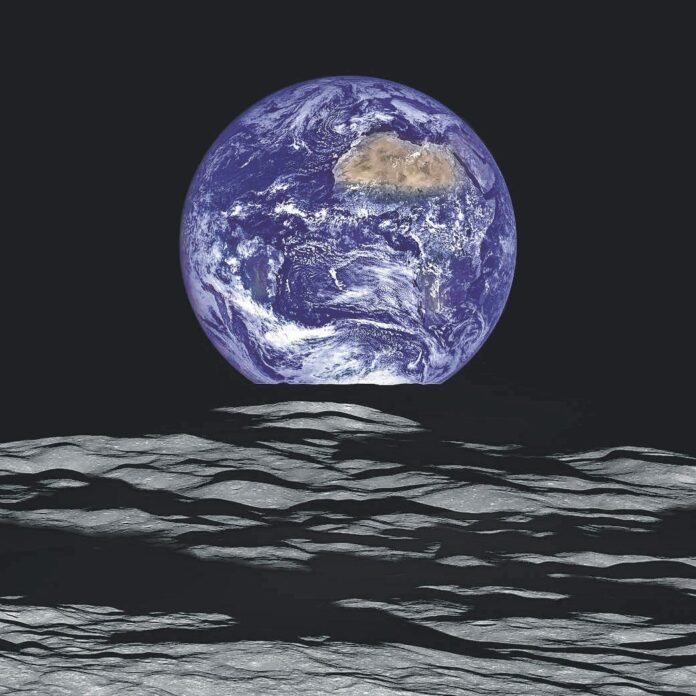
By JUDY EAST, guest columnist
A small group of people from Brown County has met several times over its concern for the future of the Earth.
We believe not enough is being done to counteract the environmental changes scientists have been telling us to expect for years. But individuals can take action to reduce the strain on the Earth and protect future generations if they understand the issues.
The group is calling itself “Earth Rising,” based on an optimistic image taken from lunar orbit by NASA astronaut William Anders on Dec. 24, 1968, during the Apollo 8 mission (pictured with this column).
Our mission is “To learn and share how to tread lightly on the Earth.” And because we want to learn, we invite others to join us and share their knowledge and ideas.
We will offer community events such as how to become more self-sufficient, a panel discussion on incorporating solar in Brown County, or in-depth articles on such topics as the decline in the bird population, importance of recycling and more.
“Maybe you think the small things we can do at home cannot solve the problems the world is facing now. But most people care and want to be part of the solution,” said Emilie Pruett, who works at the Brown County Public Library.
“Many of us making small changes will add up. Others will get on board when they see local efforts. With each small thing we do, we might think about the larger goal and take steps toward more significant changes.”
Earth Rising has compiled lots of ideas about small things most people can do to protect our Earth — even children. Below are some we would like to share today:
- Reduce the garbage at home, at work, or in your class at school.
- Think before you buy: Do I really need it? Do I already have one? Can I borrow one? How many times will I use it? Can I use something else instead? How long will I be interested in it?
- Learn to cook. Fresh ingredients come with less packaging and processing, and are usually healthier.
- Choose one big packet, carton or bottle at the store instead of lots of smaller ones with more packaging and processing.
- Reuse copier paper. If the backside is blank, use it for casual printing, drawing, or cut it smaller for lists.
- Borrow from libraries instead of buying books, magazines, music or movies.
- Donate old books.
- Take too-small clothes to the Community Closet.
- Learn to mend or alter clothing.
- Think about how you can reduce the number of plastic bags you bring home.
- Don’t use plastic cups and utensils. If you must, wash and reuse them.
- When you pack a lunch, choose reusable wrappings and containers.
- Check out the games you can borrow from the Toy Chest in Nashville’s games library ($10/year membership).
- Use rechargeable or solar-powered batteries. The ones you throw away leak chemicals into the soil.
- Ask your office or school to buy recycled paper goods.
- Turn off lights when you leave a room. Set up a place near sunlight for reading or writing.
- Recycle cans. Rinse them out and crush them first. If you use any while out and there is nowhere to recycle, take them home to recycle. Recycling one aluminum can save enough energy to run a TV for three hours. Recycling one steel can saves enough energy to power a 60-watt bulb for nearly four hours.
- Recycle glass. Recycling one bottle saves enough energy to light a 100-watt bulb for four hours.
- Check your home light bulbs. Are they LED? If not, consider changing over.
- Set up recycling bins at home or at school. Label for glass, plastic, aluminum, compost, paper (mail, newspapers, magazines, cardboard).
- Reuse grocery bags. If you run out of what you already have, use cloth bags. You can make some out of old clothing.
- Use waxed paper instead of plastic wrap or baggies for packed lunch.
- Unwrap gifts carefully and reuse the paper, or make your own from decorated paper bags or fabric.
Earth Rising has far from all the answers. We welcome your help and ideas! Do you have some expertise to teach us? Contact Judy East at [email protected] or Emilie Pruett at [email protected].




